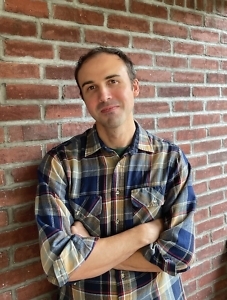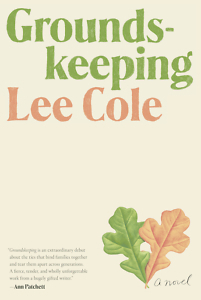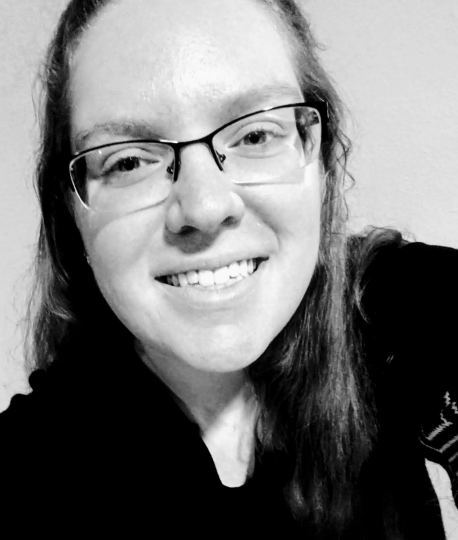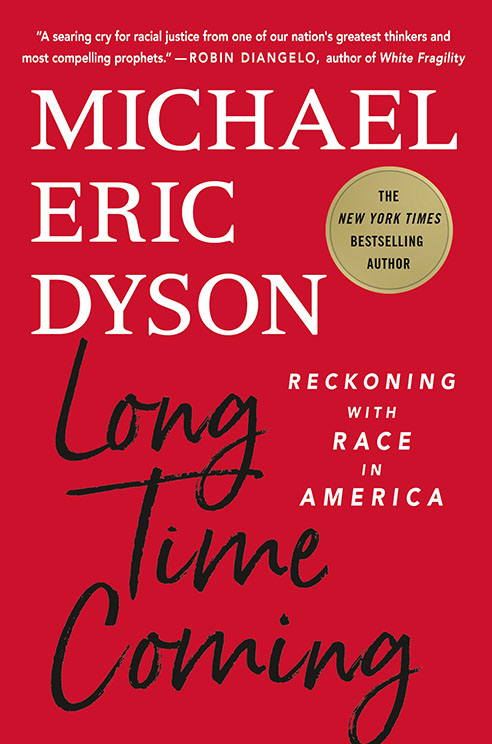A Troubled South
Lee Cole’s Groundskeeping considers love, class, and identity
“I’ve always had the same predicament,” Owen Callahan states in the opening line of Lee Cole’s debut novel, Groundskeeping. “When I’m home, in Kentucky, all I want is to leave. When I’m away, I’m homesick for a place that never was.”

Owen has recently returned to his hometown after failing to make it on his own in Colorado. He gets a job as a groundskeeper at Ashby, a small private college in the foothills. The job isn’t Owen’s first choice, but it means he can enroll in one class for free on campus, so he chooses a writing workshop. Currently crashing in the basement of his grandfather Pop’s cracker box house on the edge of Louisville, Owen is just trying to get back on his feet.
Owen wants to be a writer, but most of the writing he does is notes on his day, the landscape around him, and many of the conversations he has. His parents and Pop don’t really see the value in writing, and while Pop considers groundskeeping “an honorable vocation,” Owen’s parents still think he is not taking his life seriously. When Owen meets Alma, the visiting writer at Ashby, he finds himself generating a lot of material; however, the material is largely faithful transcriptions of his time and conversations with Alma.
Owen first meets Alma at a party thrown by one of the grad students. Owen is a bit drunk, but he sees Alma watching him and decides to approach her. When he asks where she’s from, she replies, “A country that no longer exists.” After Alma and Owen have gotten to know each other a little better, Alma quizzes Owen on how he would like to be identified as a writer, if he considers himself “more of a regional writer” and if he would like to be introduced as a “Kentucky writer” or an “American writer.” Owen responds that he does not know what it means to be a regional writer and states that “Kentucky is America … If you write about one, you’re writing about the other.” For Owen, he’s never had to consider his identity in relation to place because he has never felt connected to his hometown. Alma, on the other hand, comes from Bosniak parents who fled from the war with her when she was a child.
 After Owen attends one of Alma’s readings in a local bar, she invites him to come with her to another venue where she is meeting some of her friends. Afterward, the pair walk endlessly down the streets, talking late into the night. Once they’ve grown comfortable with each other, Alma admits that she is seeing someone, so Owen walks her back to her car, where he watches her drive away. Owen later visits a bar in Germantown with his groundskeeping coworker James, and it is there that he runs into Casey, one of the few people in his writing workshop class. Later, when Owen steps outside to relieve himself — since the only bathroom in the bar seems to be occupied indefinitely, and no one responds when the bartender beats on the locked door — he spies a parked car with a couple kissing in the front seat. He recognizes Casey by his hat, but it is only once he gets closer and the couple pulls apart that he sees the woman is Alma.
After Owen attends one of Alma’s readings in a local bar, she invites him to come with her to another venue where she is meeting some of her friends. Afterward, the pair walk endlessly down the streets, talking late into the night. Once they’ve grown comfortable with each other, Alma admits that she is seeing someone, so Owen walks her back to her car, where he watches her drive away. Owen later visits a bar in Germantown with his groundskeeping coworker James, and it is there that he runs into Casey, one of the few people in his writing workshop class. Later, when Owen steps outside to relieve himself — since the only bathroom in the bar seems to be occupied indefinitely, and no one responds when the bartender beats on the locked door — he spies a parked car with a couple kissing in the front seat. He recognizes Casey by his hat, but it is only once he gets closer and the couple pulls apart that he sees the woman is Alma.
Cole creates an interesting foil between Owen — a man who has a clear knowledge of where he is from yet who has always felt disconnected from the landscape — and Alma, who struggles with being raised as an American in Alexandria, Virginia, while still identifying strongly with her short childhood in Sarajevo. Yet Owen does feel an instinctive respect for the enduring value of place. Although he spends much of his time at work removing trees, he says, “I sometimes felt bad about felling a tree … I couldn’t shake the feeling that it was a sin, somehow.” There is a certain kind of sadness when a tree is felled, “even when the tree was dead, because you knew it had grown for decades or centuries even, attaining its prominence, and it took so little effort to topple.”
As confrontations bloom, Owen finds himself lying to multiple people to avoid conflict, effectively distancing himself from those who care about him. Alma seems to be the only light of joy remaining, but after several disagreements, Owen realizes he doesn’t know Alma quite as well as he thought. As his creative writing teacher says, people are always more complicated than they seem on the surface. Owen must navigate his own place in both the political and geographical landscape around him, even though he might isolate himself from those he loves in the process.

Abby N. Lewis is a part-time desk assistant for the North Knoxville Library. She is the author of the poetry collection Reticent and the chapbook This Fluid Journey. Her work has appeared in Across the Margin, Timber, and Red Eft Review.


